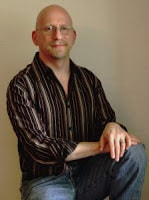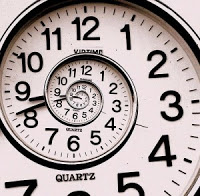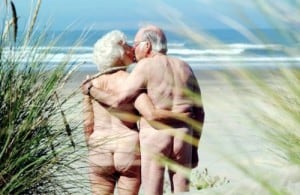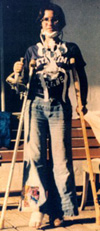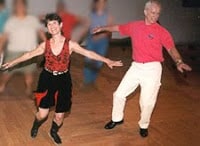Posts Tagged ‘aging stereotypes’
Has society’s view of senior sex changed? Question for my readers
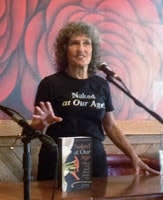 7/17/14 update: I originally wrote this post October 2012. At that time, it seemed to me that our society’s attitudes towards senior sexuality were finally starting to shift. When I began writing and speaking about the this topic in 2005, I was a rare voice talking publicly about this subject. In the past couple of years, I think we’ve made gigantic strides. A large — and loud! — community of sex educators, writers, workshop presenters, therapists, and sex-positive seniors are shattering the ageist sexual myths that our society accepted for generations, such as that our aging bodies have an expiration date when it comes to sexual pleasure. What do you think?
7/17/14 update: I originally wrote this post October 2012. At that time, it seemed to me that our society’s attitudes towards senior sexuality were finally starting to shift. When I began writing and speaking about the this topic in 2005, I was a rare voice talking publicly about this subject. In the past couple of years, I think we’ve made gigantic strides. A large — and loud! — community of sex educators, writers, workshop presenters, therapists, and sex-positive seniors are shattering the ageist sexual myths that our society accepted for generations, such as that our aging bodies have an expiration date when it comes to sexual pleasure. What do you think?
Do you think that senior sex is now accepted, even celebrated, compared to five or ten years ago? I hope you’ll comment here.
Sometimes I really feel we’re changing society’s view of aging and sexuality — other times, I wonder if I’m deluded because I surround myself with open-minded, sex-positive people who applaud my ideas and communicate similar messages to their followers.
Sometimes I get so caught up in the momentum of the world I want to live in that I think we’ve already achieved it — but have we?
Are we just a small (but loud!) part of a society that still sees sexually exuberant seniors as laughable? Or are things really changing?
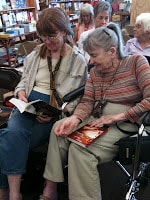 When my first senior sex book, Better Than I Ever Expected: Straight Talk about Sex After Sixty came out in 2006, it caused quite a stir in the media because it celebrated the joys of senior sex and included details of what was hot about sex after 60. (My personal favorite moment in that book is the nail-filing section — I love the smiles I see from women when I read that part aloud during a speech!)
When my first senior sex book, Better Than I Ever Expected: Straight Talk about Sex After Sixty came out in 2006, it caused quite a stir in the media because it celebrated the joys of senior sex and included details of what was hot about sex after 60. (My personal favorite moment in that book is the nail-filing section — I love the smiles I see from women when I read that part aloud during a speech!)
Then I wrote Naked at Our Age: Talking Out Loud about Senior Sex (2011) to address the challenges that prevent sex at our age from being as spicy and fulfilling as it can be. This book has won two major awards and is used and recommended by therapists and sex educators. I’m proud and grateful to all the people who contributed to that book.
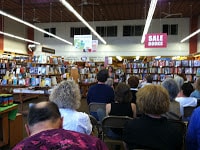 Now I’m interviewed a lot and invited to speak at conferences and other gatherings. It really feels like I’m living in a world that recognizes that our sexuality is lifelong and ageless, and no matter what else is happening in our lives — medically, emotionally, partnered or not — we are capable of this pleasure.
Now I’m interviewed a lot and invited to speak at conferences and other gatherings. It really feels like I’m living in a world that recognizes that our sexuality is lifelong and ageless, and no matter what else is happening in our lives — medically, emotionally, partnered or not — we are capable of this pleasure.
I hope you’ll post a comment so that this topic can become a discussion rather than one woman’s monologue –or her wishful thinking!
“Getting Older, Getting Better,” guest post by Charlie Glickman, PhD
One of my favorite sex nerds, Dr. Debby Herbenick, recently retweeted something that I’ve been thinking about for a while:
True. @hotaction: “Everyone should spend some time looking at photos of naked old people because that’s what the future looks like.”
— Dr. Debby Herbenick (@mysexprofessor)
Today is the 20th anniversary of the date that I met my partner. In the last two decades, we’ve both changed a lot. We’re both much more secure and solid in who we are. We’ve grown and challenged each other to overcome many of the habits that caused friction in our lives and in our connections with other people. We’ve learned many, many ways to support our relationship. And yes, our bodies have changed, too. While I’d love to have the physical resilience that I used to have, I wouldn’t trade my current life for the one I had back then. I needed that ability to bounce back- without it, I never would have survived the drama I caused myself and others.
After two decades with Elizabeth, I think she’s more beautiful than ever before and I’m more drawn to her than I could have imagined when we first met. And I think about the many people who stop being attracted to their partners and trade them in for someone younger. This seems to be more common for men, but I’ve also seen women do the same thing in increasing numbers. While I’m fully supportive of people creating the relationships they want and ending them when they no longer serve them, I can’t help but wonder about our tenacious grip on the idea that younger is better and how that affects things.
In a world that only presents the latest 18-25 year olds as sexy, it’s a challenge to not compare oneself or one’s partner with that fantasy. Personally, I’ve found that became easier when I stopped watching TV and reading the drivel that passes for news (and don’t even get me started on popular magazines). But it takes more than that. Every time you compliment someone’s appearance by telling them that they look young, you’re reinforcing the idea that we lose value as we age. I feel sadness around that because it encourages us to deny our histories, to pretend we’re something we aren’t, and to create an image of who we wish we were rather than celebrating who we’ve become. And let’s not forget that many of the cosmetic treatments to make us look younger don’t work all that well and are promoted with ads that are photoshopped like crazy. My willing suspension of disbelief snapped a long time ago.
Maybe I’ll have something different to say in another 20 years. But right now, I think that the physical expression of experience and growth is incredibly sexy. It’s an outward manifestation of the individual’s evolution. Personally, I find that much more attractive than someone who strives to look like they’re still 23. This is something that many of us have to practice. When the only images that we see define attractiveness as equivalent to youth, it can be difficult to not make comparisons.
I’ve spoken with quite a few people who are convinced that nobody will want to have sex with them because they have grey hair, or wrinkles, or scars, or stretch marks, or health concerns, or any of the other effects of age. I feel sadness that they’re so sure that they’re unattractive to others because they’re unattractive to themselves. I wonder how much of that comes from never having thought of people over a certain age as desirable. I wonder how much of that comes from the fact that so much of the breathless commentary about attractiveness (especially female attractiveness) is tied up in how young someone looks. What a waste of the incredible beauty and wisdom that surrounds us, if only we could see it.
If Elizabeth and I are fortunate, we will have lots more time together. And someday, we may get to be like the people in this photograph. I look at it and see something to be celebrated. I also know that many people will look at it and feel disgust, shame, or squicked. So what are you going to do when you get to be that age? How are you going to feel about yourself or your partner(s)? Will you be able to be naked with your partner without feeling self-disgust or shame?
The time to start thinking about older people being sexy is right now. This is the time to stop shaming elders who express desire or who want to have sex. This is the time to stop mocking their bodies or describing them negatively. When you get older, you’ll be struggling with a lot of cultural momentum and the longer you go along with it, the harder it’ll be when you finally get around to resisting (if you do). That’s especially true for women and their partners, given the extra pressure and judgement attached to youth and attractiveness for women. But really, we’re all affected by the idea that younger is better.
Instead of thinking of someone as “looking good for their age,” how about simply letting them “look good”? Instead of telling someone that they look so young, compliment them on something specific like their hairstyle or their outfit. And instead of saying insulting things about older people’s sexuality, acknowledge the feeling as your own judgment. There’s a huge difference between “that’s gross” and “I feel discomfort.” The more we can change how we think and feel about elders and sexuality, the better off we’ll be if and when we get there.
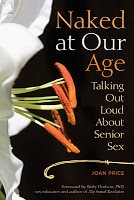 I also highly recommend Joan Price’s book Naked at Our Age: Talking Out Loud About Senior Sex. Even if you’re not there yet, there’s a good chance that you will be and many of the sexual concerns that can arise are much easier to deal with when you aren’t surprised by them. Joan interviewed and quoted lots of medical professionals, sex educators, and therapists, so it’s like you’re getting the benefit of a whole panel of experts in one book. It’s amazing.
I also highly recommend Joan Price’s book Naked at Our Age: Talking Out Loud About Senior Sex. Even if you’re not there yet, there’s a good chance that you will be and many of the sexual concerns that can arise are much easier to deal with when you aren’t surprised by them. Joan interviewed and quoted lots of medical professionals, sex educators, and therapists, so it’s like you’re getting the benefit of a whole panel of experts in one book. It’s amazing.
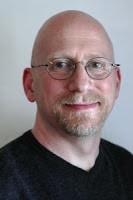
Good Vibrations, an occasional university professor, and a sexuality educator. He teaches and writes about sex-positivity, sex & shame, sexual practices and communities, relationships, and other related topics. Check him out at his website, twitter, or on Facebook.
All I Really Love About Life, I Learned After Age 50
Before age 50, I had a pretty good life. I loved my job teaching high school. I had discovered the joy of exercise, which eluded me before age 30. After a near-fatal automobile accident at 34, I turned life’s lemons into lemonade by morphing the fitness habit that had saved my life into new careers: writing magazine articles about health and fitness and teaching aerobic dance. By age 47, I had written a book.
I wasn’t so lucky in love. I had been married and unmarried to a very good man, who remains a close friend, then had a 25-year string (string? more like a giant ball of yarn!) of involvements – long-term, short-term, and casual. All warm and joyful, but not the love I sought.
At menopause, overheated and haggard from sleep deprivation, I switched from teaching sweaty aerobics at the crack of dawn to contemporary line dancing at dusk. That switch turned out to change my life… more about that in a moment.
Before age 50, I struggled to figure out who I was and wanted to be, and battled my way there. After age 50, that became easy. Rather than needing emotional kung fu to battle my way to authenticity, I could use a softer aikido approach and let what I didn’t want flow away.
After age 50, I understood that joy blossomed through living fully, whether I was single or coupled at the moment – learning new things, teaching (now in health clubs, dance halls and speaking engagements instead of high schools), keeping my own body fit and strong, interacting honestly and helpfully with others, and writing professionally. I wrote six more books after age 50!
I still hoped I’d find that special man to love, but I wasn’t putting my life on hold waiting. I realized I had to be the person I was looking for.
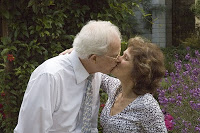 After five years of loving each other, Robert and I married. We knew he had cancer. We didn’t know we’d have only two more years together. I learned after 50 that we must treasure our loved ones while we have them, because at our age, we will lose them, or they will lose us. We must love fully and joyfully while we can.
After five years of loving each other, Robert and I married. We knew he had cancer. We didn’t know we’d have only two more years together. I learned after 50 that we must treasure our loved ones while we have them, because at our age, we will lose them, or they will lose us. We must love fully and joyfully while we can.I also learned how fragile we are, even when we do everything possible to keep our bodies and minds strong. On June 20, I tripped, slammed to the floor, and shattered my shoulder in ten places. My new book, Naked at Our Age: Talking Out Loud about Senior Sex, was due to Seal Press five weeks later. I had put the book on hold for a year after losing Robert, when grief was my day job. Then I had spent the next year writing it. Darned if I would blow off my deadline for a broken shoulder! I finished the book – on time! – typing with my arm in a sling, measuring out pain killers so that I could focus.
Resilience: that’s the major lesson I learned after 50 and continue to learn at age 66. Life continues to amaze me. What delights are next?
Note from Joan Price: I’m trying to blog my way to the AARP Orlando@50 conference. This blog post is an entry in their competition to find the official blogger to travel to and cover the event. Find out more about the conference here.
Chip August: “Sex isn’t just a piece of skin wiggling around in some other skin”
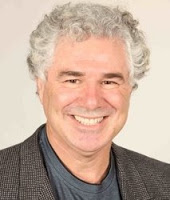
Charles “Chip” August, Personal Growth and Couples Intimacy Coach, interviewed me on his “Sex, Love & Intimacy” internet radio show. Now it’s my turn to interview Chip:
JP: I understand you’re writing a book titled “Marital Passion: The Sexless Marriage Makeover.” Do you see many later-life couples in sexless marriages?
CA: As a Couples Intimacy Coach, I have met and worked with hundreds of couples struggling with unsatisfactory sex lives, most in their 40s, 50s and 60s. But it’s not just my experience. Recently I saw a blog from Dr. Phil where he writes: “sexless marriages are an undeniable epidemic.”
JP: Why do these couples give up on sexual intimacy? Do they say it’s because of physical changes?
CA: One major factor behind the “death” of sexuality in long-term relationships is changes in our physiology brought on by aging. As young, sexually active adults, we take for granted that feelings of arousal will be accompanied by tumescence (the swelling of genital tissues), erections (nipples, clitoris, penis) and lubrication. In our minds we link these physical experiences to the idea of arousal. As we age we seem to forget all the other feelings, emotions and sensations associated with arousal.
JP: What happens emotionally when those physiological responses change?
CA: Later in life, when erections and lubrication are less certain, we falsely assume that it is the end of sexuality. It’s as if we have forgotten all the other feelings, emotions and sensations associated with arousal. We seem to forget how hot it once was to hold hands, to kiss, to talk nonsense for hours into a phone late at night, to dance, to finish each other’s sentences.
JP: I often hear from women whose men have given up on sex when their penises don’t work like they used to. I also hear from men whose women don’t want sex because they say it’s no longer comfortable or pleasurable. How can these couples reconnect?
CA: I believe human beings are designed for a lifetime of sexuality. There are many causes for a man’s erection to become unreliable or even impossible, and just as many causes for a woman’s vagina to stop lubricating or hurt. These symptoms are sometimes physiological, sometimes psychological, and sometimes just requiring a bit of education.
If your body does not work the way you believe it should, or you are experiencing a loss of desire, see your doctor, as these could be symptoms of various medical/health problems, psychiatric problems, low levels of testosterone or high levels of prolactine. Low sexual desire can also be a side effect of various medications.
JP: Besides physical changes, why else do couples give up on sexual intimacy?
CA: Beliefs about sexuality that support the idea that sex is really for “young” people. Our culture fosters age-ist, sex-negative beliefs. Most people don’t realize that sex is meant to get better and better as a relationship matures. They’ve bought into the idea that they can’t have a rockin’ sex life if they’re no longer young and the relationship is no longer new. They believe myths that sabotage their sex lives, such as “Sex just doesn’t feel good anymore—sometimes it even hurts—but I can’t talk about that with my husband,” and the most disastrous belief of all: “Passion always dies in a long-term marriage; it’s the price you pay for stability.”
JP: How do you coach people in a sexless marriage to become lovers again?
CA: To become lovers again means behaving as lovers do. When we are in new relationship energy, we gaze into each other’s eyes, we kiss, we phone and email. We send cute cards, buy flowers, go out to dinner, and go for long walks. We make time just for us.
JP: And most couples stop behaving like lovers as the relationship matures?
CA: If we spent as little time and attention working at our jobs as we spend on our relationship, most of us would be unemployed. Relationships take time. Make dates (and keep them). Get naked together and just hold each other and talk. Park with your sweetie by the lake, the beach, the overlook, and neck like you were 17 again.
JP: What’s your most important message for improving senior sex and relationships?
CA: It saddens me that sex has become so genitally focused. Our biggest erogenous zone is between our ears – our mind. Sex isn’t just a piece of skin wiggling around in some other skin. Penises in vaginas are a necessity for procreation. Sex is about intimate connection and shared vulnerability. Sex is stroking each other from head to toe, eye-gazing, shared laughter and shared thoughts. Sex is kissing and hugging and dancing. Sex is lying naked in each other’s arms listening to our hearts beating. Sex is about surrender and control, about laughing and crying.
Chas. “Chip” August is a Personal Growth and Couples Intimacy Coach, host of “Sex, Love & Intimacy” an internet radio show, and author of the soon to be published “Marital Passion: The Sexless Marriage Makeover.” Chip sees clients at his office in Northern California and also does phone-coaching, phone: 1(650) 391-7763, email him at ChasAugust@gMail.com
